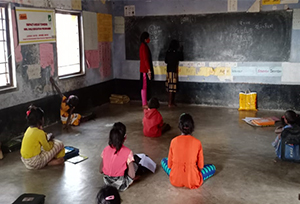Our Akarbad Learnning Centre
In West Bengal’s Purulia District, Akrabad, a dirt-poor tribal village of Sabars, with its 127 families, had faced much ostracism from its colonial-era criminal classification. With a shocking 58% illiteracy rate among females, girls of Akrabad faced a dark future ridden with child marriage and child labour. Of little value to their families, they were frequently forced to collect firewood from forests. The cloud of neglect was heavy.
The story changed with the ‘IIMPACT Girl Child Education Programme’. Girl literacy shot up by 15%, with decreasing instances of child marriage and child labour with parents welcoming the transformation. Even the village boys have taken cue from the girls and have enrolled for schooling. Today, the whole community considers education to be a road towards a better future for their children.
 During the pandemic when schools were closed and the Learning centre was discontinued due to Government lockdown the teacher made sure the children are actively engaged with education. This was possible because of the active support of the community members. Be it through phones, digital content, door to door visits, story apps or through Alternative Learning Arrangements the girls continued
During the pandemic when schools were closed and the Learning centre was discontinued due to Government lockdown the teacher made sure the children are actively engaged with education. This was possible because of the active support of the community members. Be it through phones, digital content, door to door visits, story apps or through Alternative Learning Arrangements the girls continued
